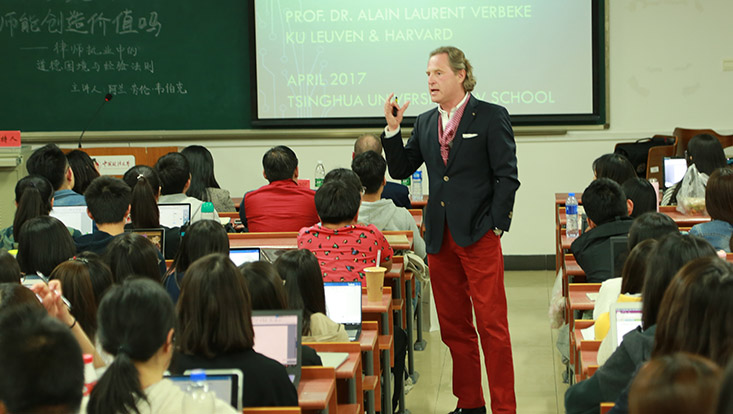Guest lecture: How lawyers create value
5 May 2017, by Internetredaktion

Photo: UHH/CESL
In a guest lecture, Alain Laurent Verbeke, Professor at University of Leuven, gives students guidelines for successful negotiation. Lawyers can help create value by reaching agreements that allow both sides to gain, he argues.
In lecture room 306, student Zang Wenbin is arm wrestling with his fellow student, Chen Huode. With their elbows placed on their wooden tables, they tightly clasp their palms into each other, so tight that their knuckles whiten. Zang Wenbin’s face reflects the questions: “He or I? Who will win?” Zang Wenbin takes a deep breath, exhales, and pushes Chen Huode’s hand down on the table — and both students quickly start over again. All around them, around 100 other law students from the China-EU School of Law and the Civil, Commercial and Economic Law School are also gripping each other’s hands. It’s Wednesday evening, and Professor Alain Laurent Verbeke is giving a guest lecture on the question “Can lawyers create value?” To start, he asked students to arm wrestle and to score as many points as possible in 15 seconds, getting one point for each time their opponent’s hand taps the table.
“Time’s up,” Prof. Verbeke shouts. “How many points did you score?” One point, most students answer, some say two, a few did not even finish. “So what has just happened here?” the professor asks. “You all fully went into combat mode, which means you tried to beat each other. However, I had asked you to score as many points as possible. So, on second thought, if you had cooperated and worked together as a team instead of trying to defeat each other, you easily would have reached a far better result.” Zang Wenbin stares in surprise at the Belgian professor, while Chen Huode and a few other students start to slightly nod their heads.
Rules of thumb in the day-to-day practice of any lawyer
Alain Laurent Verbeke’s lecture is one of six guest lectures every year, with which international legal scholars and practitioners enhance the China-EU School of Law’s regular teaching activities. He is a Professor of Private Law and Alternative Dispute Resolution at China-EU School of Law partner University of Leuven in Belgium and a Visiting Professor at Harvard Law School, USA. As a founding partner of the law firm Greenille, which merged in 2014 with one of Belgium’s largest law firms Laga, he also knows what he is talking about. “Winning a lawsuit often does not optimise value”, says Prof. Verbeke, while he walks slowly through the lecture hall. “In fact, most often, lawyers can achieve far more for their clients by abandoning this traditional attitude towards conflict.” Lawsuits also tend to have an adverse effect on the relationship between the parties in conflict, making valuable future cooperation impossible. Moreover, litigants may also have an interest in protecting their reputations. Prof. Verbeke stops in front of the blackboard. “So, ideally, lawyers create value by reaching an agreement that allows both sides to gain.”
A few rows away from Zang Wenbin and Chen Huode, student Wan Lu is carefully listening and taking notes. She is also a master’s student in her first year. Even though she still has two years of study to go before graduating, the question of how working in different legal professions differs from each other is also of importance to her. Lawyering, in particular in China, is a much younger profession than in the West. In 1957, a mere 3,000 lawyers practiced law in the whole of the People’s Republic of China, but in 2017, according to the All China Lawyers Association, the number of lawyers has surpassed 300,000. Several of the China-EU School of Law’s students, as the annual graduate survey reports, will most likely become lawyers in a few years.
